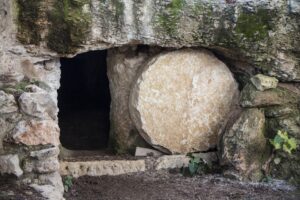For April 20, 2025
Like any other Sunday morning in Jerusalem, the Roman soldiers, stationed at Joseph’s tomb, prepared for what seemed to be an ordinary day. But this day would not be ordinary.
 The women, heartbroken and grieving, came to the tomb to embalm the body of their Savior. The tomb was sealed, guarded by Roman soldiers ready to defend it with their lives.
The women, heartbroken and grieving, came to the tomb to embalm the body of their Savior. The tomb was sealed, guarded by Roman soldiers ready to defend it with their lives.
Yet, as they approached, the earth trembled with a mighty earthquake, and the stone that sealed the tomb was rolled away, by a supernatural power. An angel, shining brighter than lightning and clothed in white as snow, appeared, and the soldiers, fell to the ground as if they were dead.
When the angel spoke, his words echoed with hope and promise that still reverberate around the world today,
Do not be afraid. I know you are looking for Jesus, who was crucified. He is not here; He has risen, just as He said. Come, see the place where He lay. Then go quickly and tell His disciples that He has risen from the dead and is going ahead of you into Galilee. There you will see Him. Now I have told you. Matthew 28:57 (NLT)
This is the moment that changed everything.
The resurrection of Jesus Christ is the cornerstone of the Christian faith. It is not just a historical event—it is the power of God unleashed on the world, offering forgiveness, redemption, and eternal life to all who believe. Skeptics may try to explain it away; they may claim the disciples stole the body, or that the women went to the wrong tomb, or that the witnesses were hallucinating. But after two thousand years, no one has ever disproven the testimony of those who witnessed the risen Christ.
The fact is that Jesus rose from the dead, and He is alive today. He is alive to offer salvation to you, to transform your life, and to give you hope beyond this world as this hymn reminds us today,
He Lives
Alfred H. Ackley1
I serve a risen Savior, He’s in the world today; I know that He is living, whatever men may say; I see His hand of mercy, I hear His voice of cheer, And just the time I need Him He’s always near.
In all the world around me I see His loving care, And tho my heart grows weary, I never will despair; I know that He is leading thro all the stormy blast, The day of His appearing will come at last.
Rejoice, Rejoice, O Christian, lift up your voice and sing Eternal hallelujahs to Jesus Christ the King! The Hope of all who seek Him, the Help of all who find, None other is so living, so good and kind.
Chorus:
He lives, He lives, Christ Jesus lives today! He walks with me and talks with me A-long life’s narrow way. He lives, He lives, salvation to impart! You ask me how I know He lives? He lives within my heart.
Because of His resurrection, we know that:
-
- Jesus is the Son of God, victorious over death and the grave. Sin and the grave have been defeated, and we, too, have new life in Him.
- God’s perfect sacrifice was accepted. We now have reconciliation with God through Christ as we repent and put our faith in Him.
- His Holy Spirit lives in us, guiding and transforming us.
Christ has risen is a message that has been passed down for two thousand years, a message that has changed countless lives, and a message that can change yours too. If you’ve never made the decision to place your faith in the risen Savior, perhaps now is the time to do so.
The resurrection isn’t just an ancient story—it’s a message of hope for all today. Jesus died for our sins, and He rose again to give us eternal life! Without Jesus, there is no hope for eternal life, now is the time to call on His name. The Bible promises that “everyone who calls on the name of the Lord will be saved” (Romans 10:13). Don’t wait. Don’t let another day pass without receiving the forgiveness and life that Jesus offers.
Christ the Lord is risen today! He is alive, and He offers us the chance to live with Him forever. Won’t you accept His invitation today? Just believe in Him and be saved.
Christ the Lord is risen today … Yes! He is risen, indeed!
What a Wonderful Savior!


 Roman soldiers who beat Him mercilessly and crucified Him on Calvary. Was Jesus a mere innocent victim, or was something far more profound taking place?
Roman soldiers who beat Him mercilessly and crucified Him on Calvary. Was Jesus a mere innocent victim, or was something far more profound taking place? sought a moment of rest before He asked for a furnished room to prepare for the Passover Seder.
sought a moment of rest before He asked for a furnished room to prepare for the Passover Seder. , conquering kings rode horses to show their power and authority over their subjects. But Jesus—our King—chose a different path. In a profound display of humility, He rode on a colt, the foal of a donkey, fulfilling the prophecy of Zechariah 9:9 (NIV),
, conquering kings rode horses to show their power and authority over their subjects. But Jesus—our King—chose a different path. In a profound display of humility, He rode on a colt, the foal of a donkey, fulfilling the prophecy of Zechariah 9:9 (NIV), for the absence of His body is the resurrection.
for the absence of His body is the resurrection.